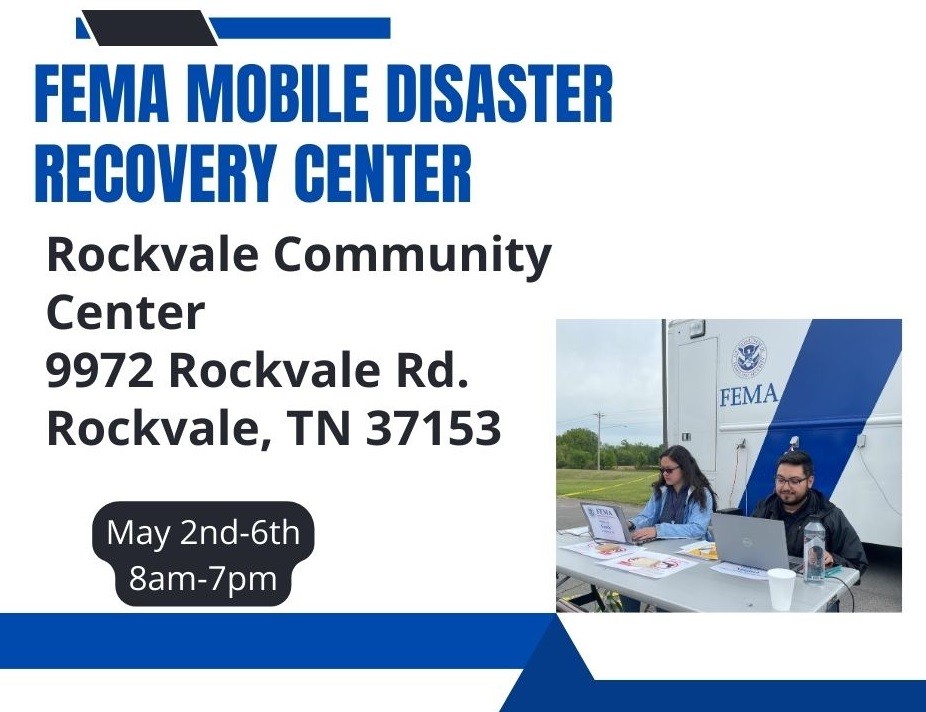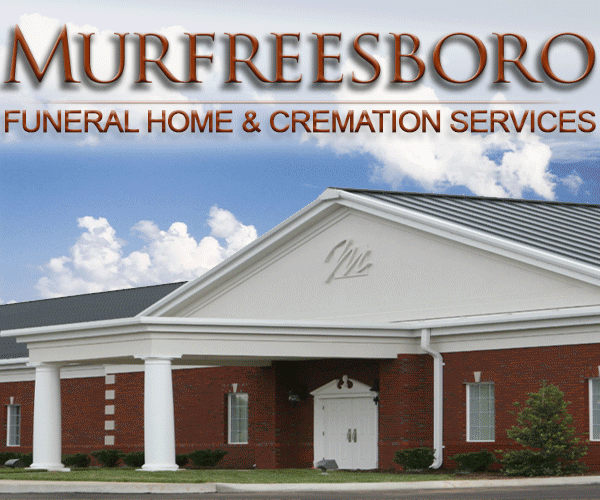(ROCKVALE, TN) If you had damage from the recent tornadoes, FEMA will be at the Rockvale Community Center this week, Tuesday-Saturday (May 2-6, 2023) from 8:00AM each morning until 7:00PM in the evening.
If you’ve already applied for FEMA assistance, you can still visit to ask a FEMA specialist questions about your application, receive clarification on letters or information from FEMA, and receive help with appeals.
Tennessee residents who were affected by the recent severe storms and tornadoes have until Tuesday, June 6, 2023, to apply for FEMA disaster assistance. Here are answers to your frequently asked questions:
Q: If I had damage from the March 31 to April 1, 2023, storms and tornadoes, am I eligible for FEMA assistance?
A: If you had damage to your primary residence and you live in one of the 10 counties designated for FEMA Individual Assistance, you may be eligible for FEMA assistance. The designated counties are: Cannon, Hardeman, Hardin, Haywood, Lewis, Macon, McNairy, Rutherford, Tipton and Wayne.
Q: I applied with FEMA and was told I was not eligible for assistance. Does that mean I can’t expect any help from FEMA?
A: No. What that means is you have 60 days from the date on your FEMA determination letter to send a written appeal. Read the letter carefully; it explains which programs you may be eligible for. In your letter asking the agency to reconsider its decision, include the documents or information FEMA requests. To speak with a specialist before writing your letter, visit the nearest Disaster Recovery Center or call the FEMA Helpline at 800-621-3362. Specialists at the recovery center can also submit your requested documents to a FEMA processing center. To find a center near you, visit https://egateway.fema.gov/
Q: I can’t rebuild my house with the money FEMA offered me. Why did I get such a small award?
A: FEMA assistance is not the same as insurance. By law, FEMA cannot provide funding for expenses when other sources – insurance, crowdfunding or financial assistance from voluntary agencies – have covered those expenses for the same disaster-related need. In other words, FEMA cannot pay for home repairs if you already received funds from your insurance company for the same repairs. FEMA doesn’t provide replacement-value amounts for damaged items or assistance with non-essential items. FEMA grants are for essential repairs to make a home safe, accessible and functional. Items considered essential include toilets, roof, critical utilities, windows and doors.
Q: My insurance settlement did not meet all my needs to help me recover from the disaster. Can I apply for additional assistance from FEMA?
A: Yes, you can apply to FEMA for additional assistance. If you received the maximum settlement from your insurance company and still have unmet disaster-related needs, write to FEMA and explain your needs. Also include the settlement documents from your insurance company.
Q: Does disaster assistance have to be repaid?
A: It depends on the type of assistance you received. If there’s a delay in your insurance settlement, any FEMA funding would be an advance that must be repaid when you receive your settlement. Since FEMA assistance is limited to covering basic needs for critical essentials, most disaster help from the federal government is offered through low-interest disaster loans from the U.S. Small Business Administration. And those SBA loans must be repaid.
Q: Can multiple people in my household file for FEMA assistance separately?
A: No. Only one application may be submitted for each household.
Q: If I am not a U.S. citizen, can someone else in my household apply for FEMA assistance?
A: Yes. To qualify for assistance from FEMA’s Individuals and Households Program, you or a member of your household must be a U.S. citizen, non-U.S. citizen national or qualified alien. However, undocumented families with diverse immigration status need only one family member with a Social Security number to apply. That family member could be a minor child who is a U.S. citizen, a non-U.S. citizen national, or a qualified alien.
- The minor child must live with the parent or guardian applying on their behalf. The parent or guardian will not have to provide any information on their own immigration status or sign any documents regarding their own status.
- A qualified alien is a legal term whose definitions include a legal permanent resident or “green card” holder; a person admitted as a refugee; a person granted asylum; a person whose deportation has been withheld; someone holding a “T” or “U” visa; or people granted status as Cuban and Haitian entrants.
Q: Why is FEMA directing me to the U.S. Small Business Administration for a loan?
A: FEMA may refer you to the SBA even if you do not own a business or home. SBA loans are the largest source of federal disaster funding for people impacted by disasters. Long-term, low-interest disaster loans for businesses, homeowners, renters and nonprofits may be available to cover losses not fully compensated by insurance or other sources.
Q: Will FEMA disaster assistance affect my Social Security payments or other government benefits?
A: No. FEMA assistance is tax-free and does not affect Social Security, Medicare or Medicaid. FEMA grants do not affect assistance provided under Tennessee’s Supplemental Nutrition Assistance Program, or SNAP; or other federal welfare and entitlement programs.
Q: Why did my neighbor get more grant money for repairs than I did?
A: FEMA considers funding for applicants on a case-by-case basis. The agency looks at your insurance status and the extent and type of damage you documented in your application.
Q: What does FEMA mean when it says: “Home is safe to occupy?”
A: Disaster-caused damage may exist, yet that may not affect whether you can live in your home. To be considered safe, the home’s exterior must be structurally sound, including the doors, roof and windows. Electricity, gas, heat, plumbing, sewer and septic systems must also function properly. Interior areas must be structurally sound, including the ceiling and floors. An inspection may be required to determine whether your home is safe, accessible and functional.
Q: I’m a renter. Can I get help from FEMA?
A: Yes. Renters whose homes and property were damaged by the storms and tornadoes can apply for federal assistance. FEMA grants can help pay for temporary housing. Renters may also qualify for grants to replace or repair necessary personal property such as furniture, appliances, clothing, textbooks or school supplies.
Q: English is not my native language. Is there someone at FEMA who speaks my language?
A: Yes. The FEMA Helpline, 800-621-3362, is staffed with specialists who speak many languages. If you use video relay service (VRS), captioned telephone service or others, give FEMA your number for that service when you apply. FEMA also offers free services to help survivors communicate with FEMA personnel on the phone or at Disaster Recovery Centers. In-person sign language interpreting is also available by request at the recovery centers. To locate a recovery center, go to https://egateway.fema.gov/
- To speak to a Spanish operator on the FEMA Helpline, press 2. For an interpreter who speaks your language, press 3. The Helpline is open from 6 a.m. to midnight Central Daylight Time daily.
Q: What if my county isn’t named in the disaster declaration?
A: If the disaster declaration doesn’t name your county for FEMA Individual Assistance, your state emergency managers may be able to offer help. To confirm if your county is designated for FEMA Individual Assistance, go to https://www.
Q: How do I prepare for a FEMA inspection?
A: The first step for a home inspection starts with a phone call, text message or email from a FEMA inspector to the applicant to schedule an appointment. Be aware that phone calls from FEMA may come from an unknown number. The inspector will try to make contact up to three times over three days. The case will be locked if the inspector cannot reach you after three attempts. If you need accommodations for language or a disability, call the FEMA Helpline at 800-621-3362 before the inspection and let FEMA know your needs.
Q: My car was destroyed in the tornadoes. Can FEMA replace my vehicle?
A: Under FEMA’s Other Needs Assistance program, the agency may help repair or replace primary vehicles lost or damaged as a direct result of severe storms and tornadoes.
Q: My medical equipment was destroyed when my home was damaged in the storms. Will FEMA replace it?
A: Under the Other Needs Assistance program, FEMA may fund uninsured essential personal property losses and other storm-related expenses such as medical equipment.
Q: After the storms, I had to store some of my personal property in a storage unit. Will FEMA pay for that?
A: FEMA financial assistance is available for moving and storage expenses if your home became unsafe to live in because of the March 31 to April 1, 2023, storms and tornadoes.
For the latest information on Tennessee’s recovery from the severe storms, straight-line winds and tornadoes, visit FEMA.gov/Disaster/4701. You may also follow TN.gov/TEMA; Twitter.com/TEMA, Facebook.com/TNDisasterInfo, @FEMARegion4/Twitter and Facebook.com/FEMA.
The Rockvale Community Center is located at 9972 Rockvale Road.
Again, FEMA will be there 8AM-7PM on May 2-6, 2023.





